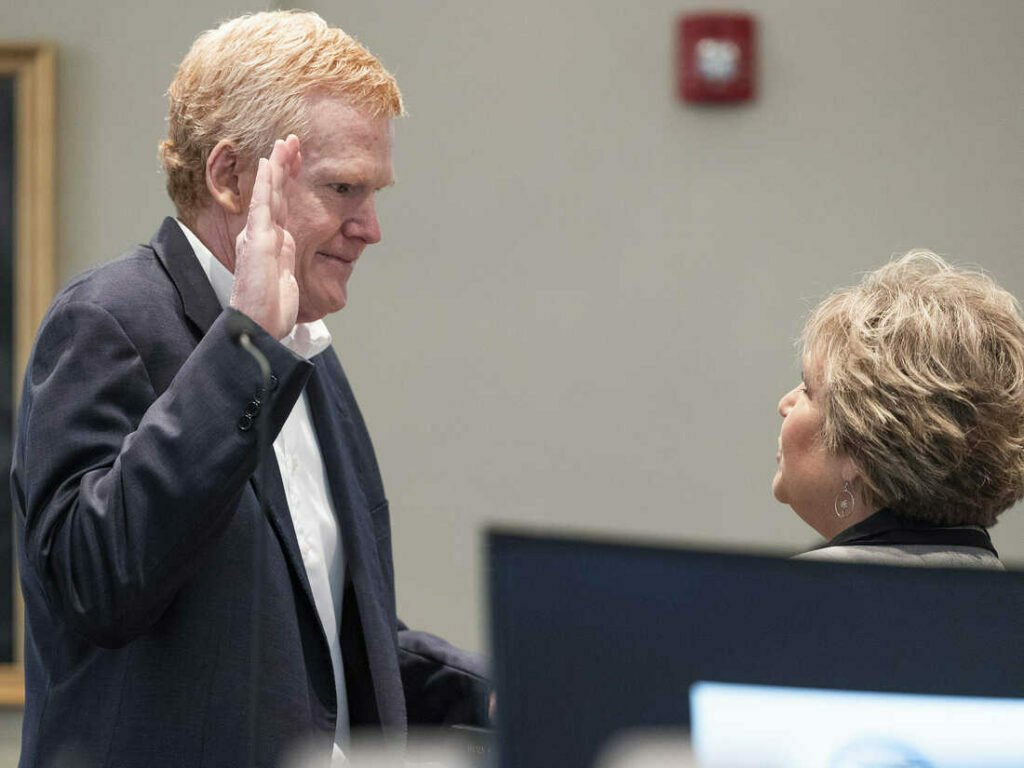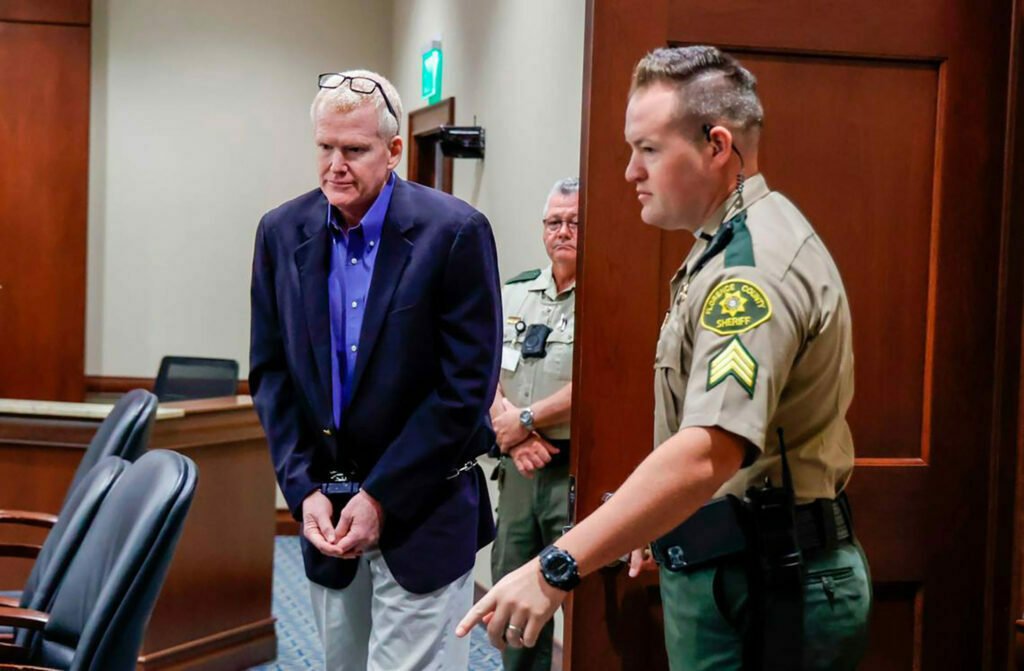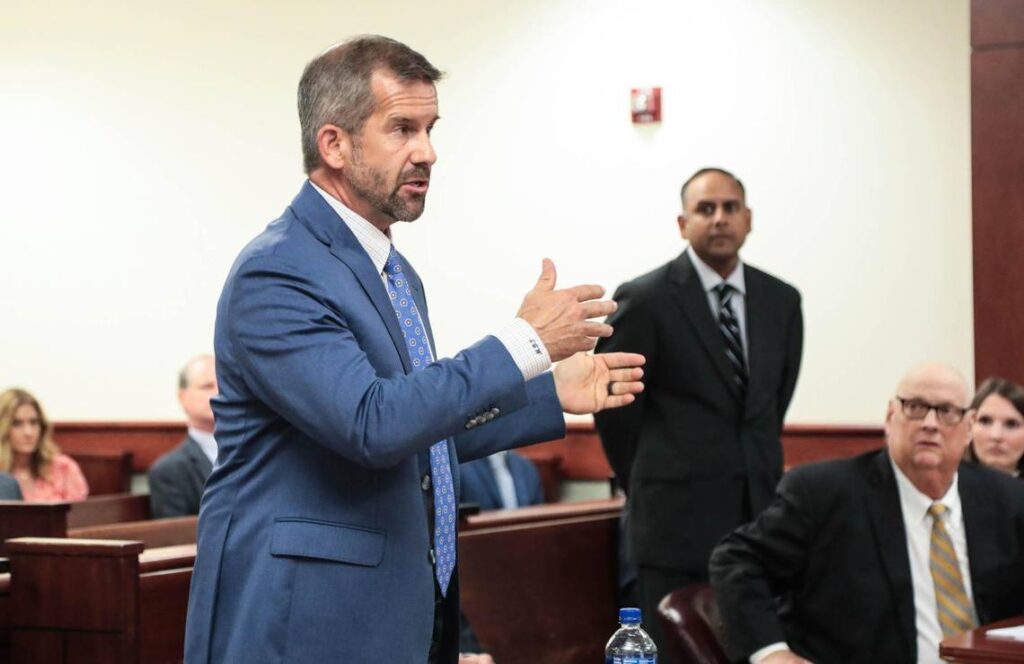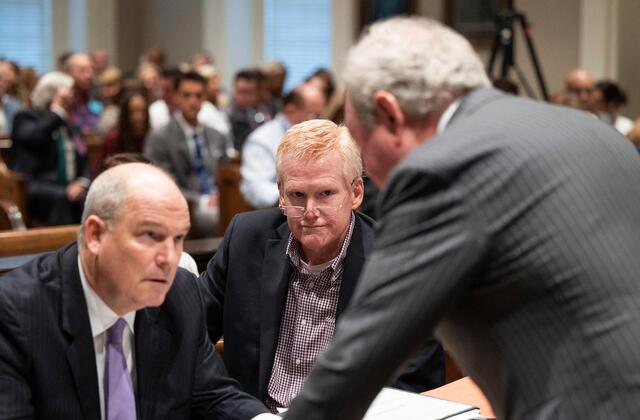The Murdaugh family ruled their rural region of South Carolina for many years before Alex Murdaugh was charged with the savage killings of his wife and son. What happened next was the startling dismantling of a life of affluence and power, revealing theft, drug use, and a botched hitman suicide plot.
The sixth week of Alex Murdaugh’s murder trial saw him take the witness stand.

Two different versions of Mr. Murdaugh testified in his own defense over the course of over ten hours in the crowded courtroom in Walterboro, South Carolina. One had a weak, lilting voice and appeared exhausted. After spending months in prison, his once-bulky build had shrunk, and his clothes hung loosely. He cried as he rocked back and forth and thrashed his head side to side.
The other appeared to be much more like the intelligent, charming, and once-powerful figure in the state’s exclusive legal scene that other witnesses had described. This Mr. Murdaugh spoke straight to the jury while being calm and in command.
What a complicated web we spin, he said to them.
A painting of his namesake, his great-grandfather Rudolph “Buster” Murdaugh, which had been removed for the trial, was now covered by a rectangular-shaped sun stain on the back wall of the courtroom.
The Murdaugh family ruled over the local prosecutor’s office and the private law company that made them wealthy for nearly a century in this southern region of South Carolina, a flat area of marshlands, palm trees, and houses with porches.
But, a string of weird and terrible occurrences since the brutal murders of his wife, Maggie, and son, Paul, in June 2021, have contributed to Mr. Murdaugh’s stunning fall from glory. The 54-year-old has refuted accusations that the murders were a desperate attempt to hide years of financial misconduct. He did, however, confess to several additional offenses while testifying, including fraud, embezzlement, and a staged assassination attempt.

One of the nation’s most keen eyes are now on the trial. It has highlighted what some regard as the Murdaugh family’s allegedly unrestrained dominance in their small town and led to the downfall of a local dynasty.
Bill Nettles, a former US attorney for South Carolina, remarked, “This is what happens when ordinary people have no checks and balances.”
“And he was not subject to checks and balances.”
Knowing the Murdaugh surname is equivalent to knowing South Carolina’s Lowcountry. The Fourteenth Judicial Circuit of the state was ruled over by three generations of Murdaugh men from 1920 to 2006, marking the longest period of family rule in American history.
Mr. Nettles declared, “They were the law.”
The Murdaughs toiled at the family-founded law firm Peters, Murdaugh, Parker, Eltzroth & Detrick (PMPED) for even longer, making a little fortune and consolidating their control over the entire Lowcountry. By all accounts, their business was the best in a locale where personal injury firms prospered.
John McCulloch, a lawyer in South Carolina, warned that “they could achieve a verdict that would considerably beyond the average.”
“They may transform a $100,000 case into a million dollar payout,” the speaker continued.
Their judicial district has a reputation as a haven for plaintiffs. Companies apparently avoided the region totally if they could.
Locals claimed that the Murdaughs’ familiar appearances to juries served as a reliable benefit during the trial.
According to South Carolina-based malpractice lawyer Eric Bland, “when individuals completed high school, they would send gifts; they paid for funerals, and they brought flowers to folks who were in the hospital.” “They sprinkled kindness around the community.”
The Murdaughs established themselves as the de facto authorities of the Lowcountry from their two offices in Hampton. Even if their influence did not extend across the entire state, it was substantial nonetheless. Residents claimed that the Murdaugh family held absolute power in the small, isolated community where they lived.
One waitress in town who also declined to disclose her name claimed that “we all knew them” and that she didn’t want to “get in trouble” for speaking out of turn. She also objected to being videotaped. You’ll just have to keep this in mind, she said. “They were strong. They went too far with it.”
In June 2021, at the Murdaugh family’s remote hunting estate, Maggie and Paul Murdaugh were killed.
Jeanne Seckinger, a former chief financial officer of PMPED, provided an account of Alex Murdaugh’s strategy as a lawyer during the third week of the trial. She described it as “essentially the art of crap.”
The reason for Mr. Murdaugh’s success, according to Ms. Seckinger, “was not his work ethic, but rather his ability to build connections and influence employees into settling with him and clients into liking him.”
Because of his hard work, he amassed millions of dollars that supported his family’s lavish lifestyle, which included a speedboat, a beach house, a sizable 1,700-acre hunting estate named Moselle, and a crew to help. Although success seemed to come naturally to Murdaugh, it was actually a cover for years of theft, fraud, and embezzlement.
Mr. Murdaugh sadly confessed on the witness stand in Walterboro to stealing $3.7 million (£3 million) from settlements intended for his clients in 2019 alone. He said it was wrong, but he was in a difficult situation because his addiction had emptied his finances.

State prosecutors created a picture of nearly unbelievable levels of fraud and theft, as well as a culprit who was confident in his immunity. They claim that Mr. Murdaugh stole indiscriminately from clients and coworkers, the young and old, the crippled and the ill. He is accused of around 100 different financial offenses.
Ms. Seckinger stated that she had observed little inconsistencies and yellow flags in Mr. Murdaugh’s files for years. But she said that the company was a “brotherhood.” “They believed in him.”
Another person who trusted Mr. Murdaugh was Tony Satterfield. Tony and his brother were advised by Mr. Murdaugh to file a wrongful death lawsuit against him and that his home insurance would cover damages when Mr. Satterfield’s mother, Gloria, who had worked as the Murdaughs’ maid for 20 years, died following a workplace accident. Even a lawyer to assist in suing him was suggested by him.
The total payout from two of Mr. Murdaugh’s insurance policies was $4.3 million, but the Satterfields received nothing. They had no idea that the dispute had been resolved. As he acknowledged in court, Alex Murdaugh had taken it.
The malpractice attorney who defended the Satterfields in their case against Mr. Murdaugh, Eric Bland, stated, “I feel like if someone had paid better attention, they would have found this out.” But those youngsters respected and believed in the Murdaughs.
People go great distances to attend the trial because it has captured the attention of America.
Another deadly accident occurred near the Murdaugh household one year following Gloria Satterfield’s demise. Yet, the catastrophe this time, according to the prosecution, would present a challenge that Alex Murdaugh could not handle.
On the night of February 24, 2019, late in the evening, Paul Murdaugh was on board the family boat when it crashed into a bridge, sending three of the six occupants — all young adults — flying into the chilly water below. Mallory Beach, age 19, was one of them. Her body was found days later in a marsh some distance away.
All the other passengers agreed that Paul had been operating the vehicle at the time of impact. The 19-year-old Murdaugh’s blood alcohol level was three times the legal limit, according to a blood test.
When the witness accounts from the same night are considered as a whole, Mr. Murdaugh appears to be hellbent on protecting his son. They claimed that he moved around the room, attempting to communicate with the teenagers. He appeared to be trying to “orchestrate something,” according to a nurse. Mr. Murdaugh allegedly urged one passenger, Connor Cook, in a deposition “to keep my mouth quiet.” He claimed that “them being who they are” had made him afraid.
On the testimony stand last week, Mr. Murdaugh described as “absolutely untrue” any assertions that he had “manipulated witnesses” or affected any aspect of the boat disaster inquiry.
Alex Murdaugh is suspected of killing both his youngest son Paul and his wife Maggie. Yet, the boat catastrophe was perceived “as a test of the system” by those in the Lowcountry, according to Mandy Mattney, a South Carolina-based journalist who has been in charge of covering the Murdaughs since 2019. Everyone in Hampton had a strong conviction that Paul wouldn’t be prosecuted.
Yet a few months later, Paul was accused of three offenses, including drunken boating that caused a fatality. He entered a not guilty plea to the charges but passed away before going to trial.
Looking back, it might have been the turning point in Alex Murdaugh’s life.
The family of Mallory Beach chose Mark Tinsley as their attorney to represent them in the potentially multimillion dollar wrongful death lawsuit against Mr. Murdaugh.
Mr. Murdaugh stated that he was poor. During the trial this month, Mr. Tinsley said, “I didn’t believe it.”
In order to compel Mr. Murdaugh to divulge his finances, Mr. Tinsley filed a motion. The date of the hearing was set for June 10, 2021. The information would make his years of business fraud public.
The fuse was ignited, according to Mr. Tinsley.
In relation to his wife and son’s slayings, Mr. Murdaugh has entered a not-guilty plea.
Three days before the hearing regarding his finances was set for June 7, 2021, Alex Murdaugh dialed 911. He claimed that his son Paul and wife Maggie had both been shot.
Paul and Maggie had been killed in retaliation for the boat tragedy, according to Mr. Murdaugh’s hypothesis, by the time the first deputy of the sheriff arrived at Moselle.
About his kid, Mr. Murdaugh stated, “He’s getting threats.” “I am aware that is the case.”
He was widely believed in the Lowcountry, and once Paul passed away, the wrongful death claim was abandoned.
But, Mr. Murdaugh contacted 911 once more three months later, this time to tell that he had been shot in the head on the side of a country road. Afterwards, he acknowledged planning a hit on himself so that his son Buster, who was still alive, might be compensated by his life insurance. His company revealed that they had fired him the day before the tragedy due to allegations of misappropriation as the plan started to fall apart.
The deaths of Maggie and Paul remained a mystery for months as a result of the lack of information provided by the authorities regarding potential suspects or a possible motive. After that, Mr. Murdaugh was detained in connection with the killings in July 2022.
The Walterboro courthouse has seen early morning crowds for more than a month, with a line that extends outside the building. Observers in suits and sundresses have occupied every row of the dark wooden pews that line the courtroom upstairs, where the air is cool. The presence of Mr. Murdaugh’s brother and son, who were milling about and exchanging handshakes and tepid smiles, at times gave the atmosphere an oddly church reception-like feel.
In the upcoming days, both the prosecution and defense will make their final arguments before the jury disperses to deliberate.
The Murdaugh family ruled their rural region of South Carolina for many years before Alex Murdaugh was charged with the savage killings of his wife and son. What happened next was the startling dismantling of a life of affluence and power, revealing theft, drug use, and a botched hitman suicide plot.
Some words might offend you.
The sixth week of Alex Murdaugh’s murder trial saw him take the witness stand.
Two different versions of Mr. Murdaugh testified in his own defense over the course of over ten hours in the crowded courtroom in Walterboro, South Carolina. One had a weak, lilting voice and appeared exhausted. After spending months in prison, his once-bulky build had shrunk, and his clothes hung loosely. He cried as he rocked back and forth and thrashed his head side to side.
The other appeared to be much more like the intelligent, charming, and once-powerful figure in the state’s exclusive legal scene that other witnesses had described. This Mr. Murdaugh spoke straight to the jury while being calm and in command.
What a complicated web we spin, he said to them.
A painting of his namesake, his great-grandfather Rudolph “Buster” Murdaugh, which had been removed for the trial, was now covered by a rectangular-shaped sun stain on the back wall of the courtroom.
The Murdaugh family ruled over the local prosecutor’s office and the private law company that made them wealthy for nearly a century in this southern region of South Carolina, a flat area of marshlands, palm trees, and houses with porches.
But, a string of weird and terrible occurrences since the brutal murders of his wife, Maggie, and son, Paul, in June 2021, have contributed to Mr. Murdaugh’s stunning fall from glory. The 54-year-old has refuted accusations that the murders were a desperate attempt to hide years of financial misconduct. He did, however, confess to several additional offenses while testifying, including fraud, embezzlement, and a staged assassination attempt.
One of the nation’s most keen eyes are now on the trial. It has highlighted what some regard as the Murdaugh family’s allegedly unrestrained dominance in their small town and led to the downfall of a local dynasty.
Bill Nettles, a former US attorney for South Carolina, remarked, “This is what happens when ordinary people have no checks and balances.”
“And he was not subject to checks and balances.”
Knowing the Murdaugh surname is equivalent to knowing South Carolina’s Lowcountry. The Fourteenth Judicial Circuit of the state was ruled over by three generations of Murdaugh men from 1920 to 2006, marking the longest period of family rule in American history.
Mr. Nettles declared, “They were the law.”
The Murdaughs toiled at the family-founded law firm Peters, Murdaugh, Parker, Eltzroth & Detrick (PMPED) for even longer, making a little fortune and consolidating their control over the entire Lowcountry. By all accounts, their business was the best in a locale where personal injury firms prospered.
John McCulloch, a lawyer in South Carolina, warned that “they could achieve a verdict that would considerably beyond the average.”
“They may transform a $100,000 case into a million dollar payout,” the speaker continued.
Their judicial district has a reputation as a haven for plaintiffs. Companies apparently avoided the region totally if they could.
Locals claimed that the Murdaughs’ familiar appearances to juries served as a reliable benefit during the trial.
According to South Carolina-based malpractice lawyer Eric Bland, “when individuals completed high school, they would send gifts; they paid for funerals, and they brought flowers to folks who were in the hospital.” “They sprinkled kindness around the community.”
The Murdaughs established themselves as the de facto authorities of the Lowcountry from their two offices in Hampton. Even if their influence did not extend across the entire state, it was substantial nonetheless. Residents claimed that the Murdaugh family held absolute power in the small, isolated community where they lived.
One waitress in town who also declined to disclose her name claimed that “we all knew them” and that she didn’t want to “get in trouble” for speaking out of turn. She also objected to being videotaped. You’ll just have to keep this in mind, she said. “They were strong. They went too far with it.”
In June 2021, at the Murdaugh family’s remote hunting estate, Maggie and Paul Murdaugh were killed.
Jeanne Seckinger, a former chief financial officer of PMPED, provided an account of Alex Murdaugh’s strategy as a lawyer during the third week of the trial. She described it as “essentially the art of crap.”
The reason for Mr. Murdaugh’s success, according to Ms. Seckinger, “was not his work ethic, but rather his ability to build connections and influence employees into settling with him and clients into liking him.”
Because of his hard work, he amassed millions of dollars that supported his family’s lavish lifestyle, which included a speedboat, a beach house, a sizable 1,700-acre hunting estate named Moselle, and a crew to help. Although success seemed to come naturally to Murdaugh, it was actually a cover for years of theft, fraud, and embezzlement.
Mr. Murdaugh sadly confessed on the witness stand in Walterboro to stealing $3.7 million (£3 million) from settlements intended for his clients in 2019 alone. He said it was wrong, but he was in a difficult situation because his addiction had emptied his finances.
State prosecutors created a picture of nearly unbelievable levels of fraud and theft, as well as a culprit who was confident in his immunity. They claim that Mr. Murdaugh stole indiscriminately from clients and coworkers, the young and old, the crippled and the ill. He is accused of around 100 different financial offenses.
Ms. Seckinger stated that she had observed little inconsistencies and yellow flags in Mr. Murdaugh’s files for years. But she said that the company was a “brotherhood.” “They believed in him.”
Another person who trusted Mr. Murdaugh was Tony Satterfield. Tony and his brother were advised by Mr. Murdaugh to file a wrongful death lawsuit against him and that his home insurance would cover damages when Mr. Satterfield’s mother, Gloria, who had worked as the Murdaughs’ maid for 20 years, died following a workplace accident. Even a lawyer to assist in suing him was suggested by him.
The total payout from two of Mr. Murdaugh’s insurance policies was $4.3 million, but the Satterfields received nothing. They had no idea that the dispute had been resolved. As he acknowledged in court, Alex Murdaugh had taken it.
The malpractice attorney who defended the Satterfields in their case against Mr. Murdaugh, Eric Bland, stated, “I feel like if someone had paid better attention, they would have found this out.” But those youngsters respected and believed in the Murdaughs.
People go great distances to attend the trial because it has captured the attention of America.
Another deadly accident occurred near the Murdaugh household one year following Gloria Satterfield’s demise. Yet, the catastrophe this time, according to the prosecution, would present a challenge that Alex Murdaugh could not handle.
On the night of February 24, 2019, late in the evening, Paul Murdaugh was on board the family boat when it crashed into a bridge, sending three of the six occupants — all young adults — flying into the chilly water below. Mallory Beach, age 19, was one of them. Her body was found days later in a marsh some distance away.
All the other passengers agreed that Paul had been operating the vehicle at the time of impact. The 19-year-old Murdaugh’s blood alcohol level was three times the legal limit, according to a blood test.
When the witness accounts from the same night are considered as a whole, Mr. Murdaugh appears to be hellbent on protecting his son. They claimed that he moved around the room, attempting to communicate with the teenagers. He appeared to be trying to “orchestrate something,” according to a nurse. Mr. Murdaugh allegedly urged one passenger, Connor Cook, in a deposition “to keep my mouth quiet.” He claimed that “them being who they are” had made him afraid.
On the testimony stand last week, Mr. Murdaugh described as “absolutely untrue” any assertions that he had “manipulated witnesses” or affected any aspect of the boat disaster inquiry.
Alex Murdaugh is suspected of killing both his youngest son Paul and his wife Maggie. Yet, the boat catastrophe was perceived “as a test of the system” by those in the Lowcountry, according to Mandy Mattney, a South Carolina-based journalist who has been in charge of covering the Murdaughs since 2019. Everyone in Hampton had a strong conviction that Paul wouldn’t be prosecuted.
Yet a few months later, Paul was accused of three offenses, including drunken boating that caused a fatality. He entered a not guilty plea to the charges but passed away before going to trial.
Looking back, it might have been the turning point in Alex Murdaugh’s life.
The family of Mallory Beach chose Mark Tinsley as their attorney to represent them in the potentially multimillion dollar wrongful death lawsuit against Mr. Murdaugh.

Mr. Murdaugh stated that he was poor. During the trial this month, Mr. Tinsley said, “I didn’t believe it.”
In order to compel Mr. Murdaugh to divulge his finances, Mr. Tinsley filed a motion. The date of the hearing was set for June 10, 2021. The information would make his years of business fraud public.
The fuse was ignited, according to Mr. Tinsley.
In relation to his wife and son’s slayings, Mr. Murdaugh has entered a not-guilty plea.
Three days before the hearing regarding his finances was set for June 7, 2021, Alex Murdaugh dialed 911. He claimed that his son Paul and wife Maggie had both been shot.
Paul and Maggie had been killed in retaliation for the boat tragedy, according to Mr. Murdaugh’s hypothesis, by the time the first deputy of the sheriff arrived at Moselle.
About his kid, Mr. Murdaugh stated, “He’s getting threats.” “I am aware that is the case.”
He was widely believed in the Lowcountry, and once Paul passed away, the wrongful death claim was abandoned.
But, Mr. Murdaugh contacted 911 once more three months later, this time to tell that he had been shot in the head on the side of a country road. Afterwards, he acknowledged planning a hit on himself so that his son Buster, who was still alive, might be compensated by his life insurance. His company revealed that they had fired him the day before the tragedy due to allegations of misappropriation as the plan started to fall apart.
The deaths of Maggie and Paul remained a mystery for months as a result of the lack of information provided by the authorities regarding potential suspects or a possible motive. After that, Mr. Murdaugh was detained in connection with the killings in July 2022.
The Walterboro courthouse has seen early morning crowds for more than a month, with a line that extends outside the building. Observers in suits and sundresses have occupied every row of the dark wooden pews that line the courtroom upstairs, where the air is cool. The presence of Mr. Murdaugh’s brother and son, who were milling about and exchanging handshakes and tepid smiles, at times gave the atmosphere an oddly church reception-like feel.
In the upcoming days, both the prosecution and defense will make their final arguments before the jury disperses to deliberate.

Many people in the Lowcountry here claimed to think Alex Murdaugh was the last person standing.
But, the Murdaugh family has made an ally of jurors over the years, leaving courtrooms with verdicts that increased their fortunes and solidified their power.
In a situation where all the evidence is circumstantial—no murder weapon was discovered, there was no blood on Mr. Murdaugh’s t-shirt that night, and there were no eyewitnesses to the killings—Alex Murdaugh’s destiny will be determined in the same manner, possibly as a final test of his sway.
And his decision to testify, which was both rare and risky from a legal standpoint, was maybe evidence of his unwavering self-belief and faith in his capacity to persuade others, as he has done for years.
He declared last week, “I can assure you, I would injure myself before I would hurt one of them. It is beyond a doubt.




